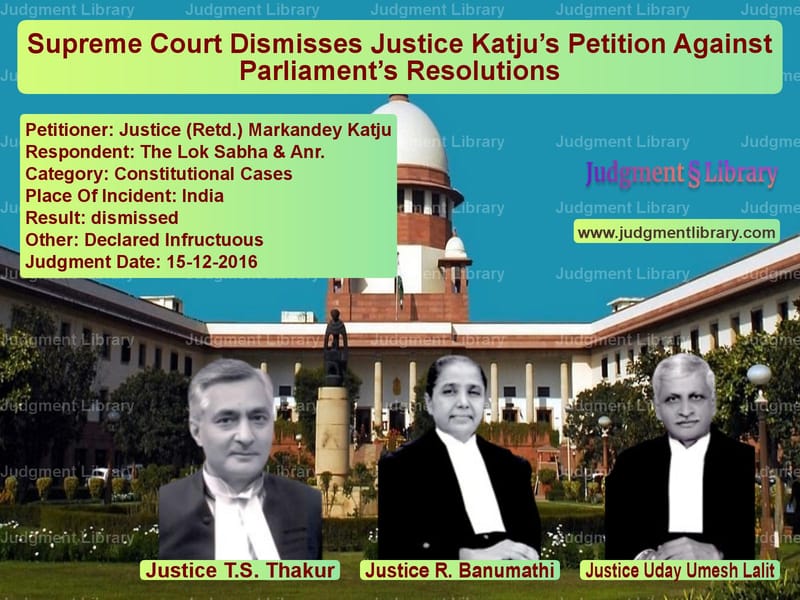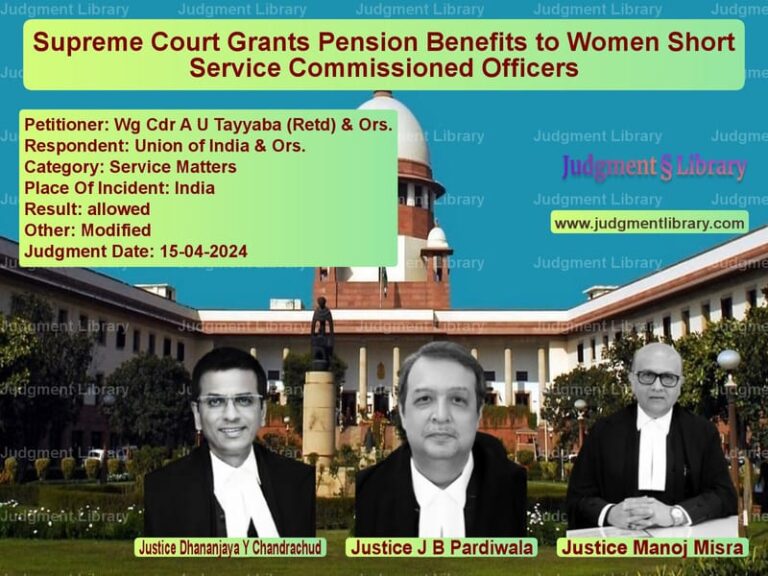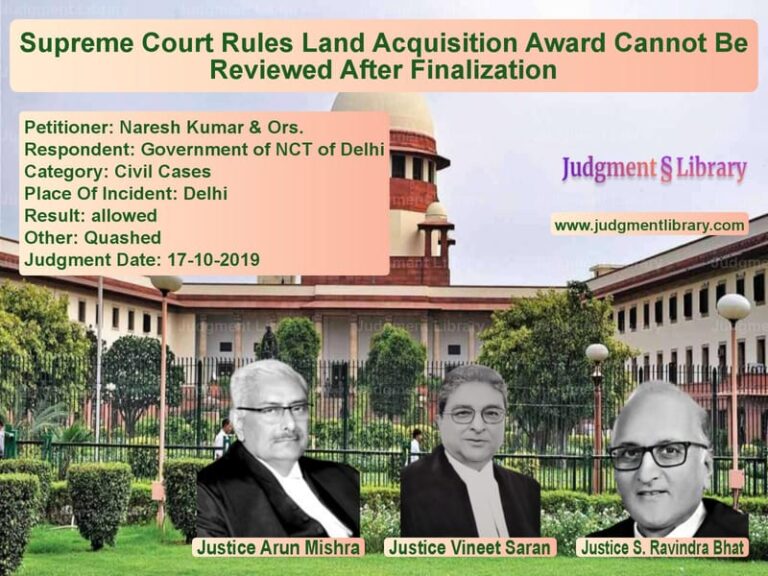Supreme Court Dismisses Justice Katju’s Petition Against Parliament’s Resolutions
The case of Justice (Retd.) Markandey Katju vs. The Lok Sabha & Anr. involved a constitutional challenge against resolutions passed by the Rajya Sabha and Lok Sabha condemning statements made by the petitioner. Justice Katju sought the quashing of these resolutions, arguing that they violated his fundamental right to free speech under Article 19(1)(a) of the Constitution and were beyond the jurisdiction of Parliament. The Supreme Court dismissed the petition, upholding the Parliament’s privilege to express opinions on matters of public interest.
Background of the Case
On March 10, 2015, Justice (Retd.) Markandey Katju, a former Judge of the Supreme Court of India and former Chairman of the Press Council of India, published two controversial posts on his Facebook page:
- One titled “Gandhi – A British Agent” claimed that Mahatma Gandhi did great harm to India.
- The second post referred to Netaji Subhash Chandra Bose as an agent of Japanese fascism.
These statements triggered widespread debate and outrage. On March 11, 2015, the Rajya Sabha debated the matter and passed a resolution condemning Katju’s remarks. The resolution stated:
“This House expresses its unequivocal condemnation of the recent remarks of the former judge of the Supreme Court, Shri Justice Markandey Katju, against the Father of the Nation Mahatma Gandhi and Netaji Subhash Chandra Bose, who led the Indian National Army for the freedom of the country.”
On March 12, 2015, the Lok Sabha also passed a similar resolution:
“Father of the Nation Mahatma Gandhi and Netaji Shri Subhash Chandra Bose are venerated by the entire country. Their contributions to the freedom struggle and dedication are unparalleled. The statement given by the former Judge of the Supreme Court and former Chairman of the Press Council of India Shri Markandey Katju is deplorable. This House unequivocally condemns his statement unanimously.”
On March 23, 2015, Justice Katju wrote to the Chairman of the Rajya Sabha and the Speaker of the Lok Sabha, requesting that the resolutions be recalled or that he be granted an opportunity to be heard. He argued that the resolutions were passed without giving him a fair hearing, violating principles of natural justice. Having received no response, he filed a writ petition under Article 32 of the Constitution.
Legal Issues Raised
Justice Katju framed the following key legal questions:
- Does Article 19(1)(a) of the Constitution guarantee an individual the freedom to hold and publicly express dissenting opinions?
- Can Parliament, in the absence of a law framed under Article 19(2), exercise jurisdiction over an individual and express disapproval of their opinions?
- Does the privilege under Article 105(1) of the Constitution allow Parliament to express views on private citizens’ statements?
- Can either House of Parliament condemn an individual or their speech when they are not public servants and when their statements do not interfere with the functioning of Parliament?
- If Parliament had the jurisdiction to pass such resolutions, was it required to grant an opportunity of hearing to the affected individual?
Supreme Court’s Judgment
The Supreme Court, after hearing the arguments, dismissed the petition. The Court held that Parliament has the privilege to express opinions on matters of public interest and that the resolutions did not violate Justice Katju’s fundamental rights. The key findings of the Court were:
- Parliament’s freedom of speech under Article 105 is absolute and unfettered in the course of its business.
- Resolutions condemning statements on national figures were well within Parliament’s rights and did not infringe upon Justice Katju’s rights.
- The resolutions did not impose any civil or criminal penalties on Justice Katju and thus did not violate his rights under Article 19(1)(a).
- While Parliament must ensure fairness when exercising punitive powers such as breach of privilege, expressing an opinion does not require a hearing.
The Court concluded:
“Freedom of speech in Parliament is subject only to such provisions of the Constitution which relate to the regulation of procedure in Parliament. There is no constitutional restriction on what can be debated in Parliament, except as provided under Article 121.”
Impact of the Judgment
This ruling has significant implications for parliamentary privileges and freedom of speech in India. It reinforces the principle that:
- Parliament is free to discuss and express opinions on matters of national importance.
- Resolutions passed by Parliament condemning public statements do not constitute legal penalties.
- Freedom of speech under Article 19(1)(a) does not grant immunity from criticism, even if it comes from Parliament.
Conclusion
The Supreme Court’s ruling establishes that while individuals have the right to free speech, they are also subject to criticism, including by Parliament. Justice Katju’s case reaffirms the balance between parliamentary privileges and individual rights, setting a precedent for future cases involving expressions of dissent.
Don’t miss out on the full details! Download the complete judgment in PDF format below and gain valuable insights instantly!
Download Judgment: Justice (Retd.) Mark vs The Lok Sabha & Anr. Supreme Court of India Judgment Dated 15-12-2016.pdf
Direct Downlaod Judgment: Direct downlaod this Judgment
See all petitions in Fundamental Rights
See all petitions in Judgment by T.S. Thakur
See all petitions in Judgment by R. Banumathi
See all petitions in Judgment by Uday Umesh Lalit
See all petitions in dismissed
See all petitions in Declared Infructuous
See all petitions in supreme court of India judgments December 2016
See all petitions in 2016 judgments
See all posts in Constitutional Cases Category
See all allowed petitions in Constitutional Cases Category
See all Dismissed petitions in Constitutional Cases Category
See all partially allowed petitions in Constitutional Cases Category







